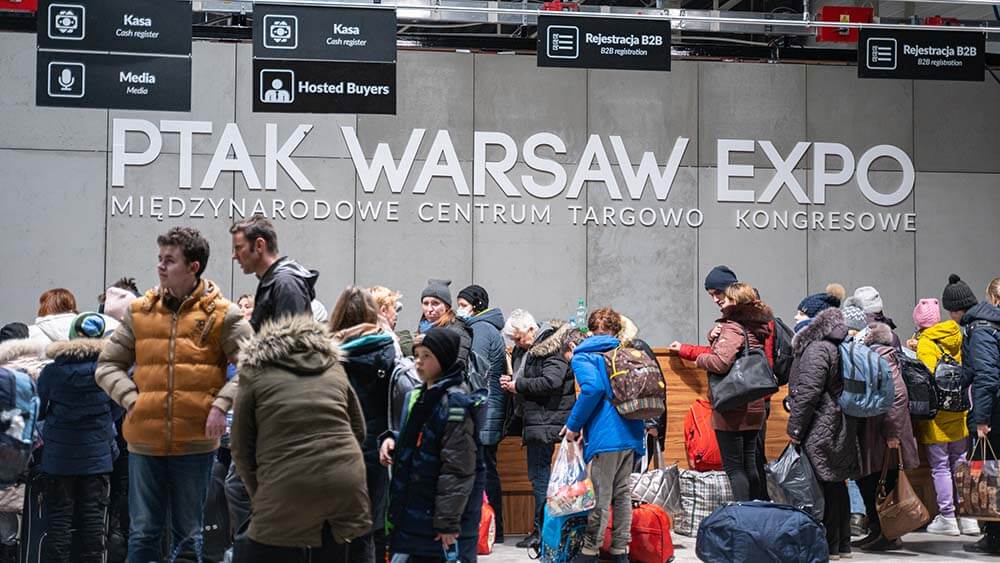
Refugees from Ukraine arrive at the Ptak Warsaw Expo Trade Fair and Congress Center in Poland, which has been converted to an aid center for those fleeing the Russian invasion of Ukraine. (Courtesy of Ptak Warsaw Expo)

Sherrif Karamat, CAE, President & CEO, PCMA
Just as it seems we may be getting over the worst of COVID — at least for the moment — the world is witnessing the horrors of Russia’s attack on Ukraine and the humanitarian crisis as Europe scrambles to help the millions of refugees escaping the war.
And as I write this, the U.S. is experiencing inflation, which climbed during February at the fastest pace in 40 years. This, of course, adds to our challenges as we remain wary about the potential for another COVID variant to cause cases to spike. But it’s important to remind ourselves that our industry has experienced other big disruptors over the past 20 years, such as 9/11, SARS, damaging hurricanes including Katrina, a financial crisis and recession, the Zika and West Nile viruses, ash clouds, and more.
It’s crises like these that bring to light the contributions our industry makes, not only our power to drive economic good, but to bring people together to solve complex issues and drive progress — something Vodafone CEO Nick Reed highlighted when he spoke to the audience at Mobile World Congress, right after the Russian invasion in Barcelona. “With the backdrop of the Ukraine war,” CNBC reported Reed said, “it’s a conference like this that reminds me of the importance of global sectors and communities like ours working together to advance society.”
COVID has given the global business events industry permission to experiment in the way we bring our members, customers, and audiences together to solve their challenges. Two years ago, we responded to COVID by bringing our face-to-face events online. We weren’t prepared, yet we may have been given a golden opportunity. We just didn’t know it at the time.
Digital and F2F are merely channels — they are not competitors. We have to think how these each can best meet our audience’s needs.
We’ve learned that nothing online can replace the experience of face-to-face networking. Early-career oncologist Andrea Anampa-Guzman recently shared how attending her first-ever ASH Annual Meeting & Exposition in person in 2019 changed her career path. With today’s technology, she told health-care website Healio, recorded sessions can be watched from home, but making contacts are invaluable benefits of in-person meetings that are lost with a virtual event.
At the same time, my biggest concern is that we will try to run back to what was — and not take the learnings from digital events to drive participant engagement. We cannot afford to have a disconnect between business event strategists and a change in consumer behavior.
As Rebecca Nunez, CEO of marketing agency MRN said in a recent Digiday article about the return of SXSW in Austin: “Industry thought leaders could never crack that code to make a live event live beyond the event. Now, here we are. In the next year or so, any physical event that has cultural currency will have to have a hybrid experience attached.”
Support for Ukraine
PCMA is among many industry associations, venues, and travel companies that have condemned the Russian invasion of Ukraine and contributed to the aid of Ukrainian refugees. The Convene team compiled a list of Ukraine support initiatives that, taken together, demonstrate the collective power of our industry to make a difference when we are united by a cause.
